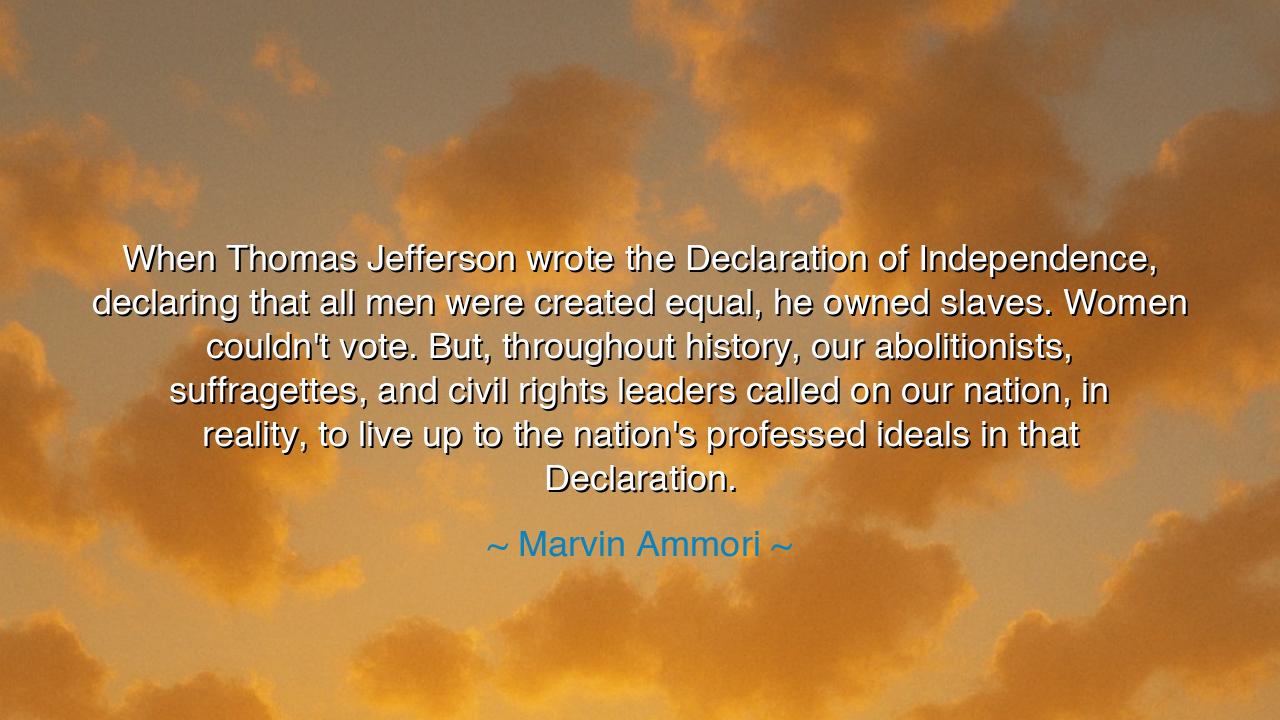
When Thomas Jefferson wrote the Declaration of Independence
When Thomas Jefferson wrote the Declaration of Independence, declaring that all men were created equal, he owned slaves. Women couldn't vote. But, throughout history, our abolitionists, suffragettes, and civil rights leaders called on our nation, in reality, to live up to the nation's professed ideals in that Declaration.






The words of Marvin Ammori, when he said, “When Thomas Jefferson wrote the Declaration of Independence, declaring that all men were created equal, he owned slaves. Women couldn’t vote. But, throughout history, our abolitionists, suffragettes, and civil rights leaders called on our nation, in reality, to live up to the nation’s professed ideals in that Declaration,” are both a lament and a call to awakening. In these words lies a truth as old as human striving — that ideals are born pure, but their fulfillment requires the courage of generations. Ammori reminds us that the Declaration of Independence, though a beacon of liberty, was born amidst contradiction: it spoke of equality while surrounded by inequality, it promised freedom while many lived in bondage. Yet he also shows us the enduring power of those words — that they became not just a statement of intent, but a challenge across centuries: a moral mirror held up to the nation, daring it to become what it had proclaimed to be.
When Thomas Jefferson wrote that “all men are created equal,” he penned a truth greater than himself — a truth that transcended the limitations of his time. In his hand, the ink may have flowed with hypocrisy, but in his words, destiny took shape. Those lines became sacred, not because the man who wrote them was perfect, but because they captured the eternal yearning of the human soul: to be free, to be recognized, to be treated as fully human. In this, Ammori speaks like a historian and a prophet. He does not condemn the past merely for its failings; rather, he honors those who wrestled with its contradictions and transformed its promises into progress.
For it was the abolitionists, those warriors of conscience, who first seized upon Jefferson’s words as both weapon and witness. They asked the nation: How can you claim liberty, yet bind men in chains? They turned the Declaration of Independence against the complacency of their own era, reminding their fellow citizens that the Revolution’s promise was unfinished. Think of Frederick Douglass, who stood before white audiences and thundered, “What, to the American slave, is your Fourth of July?” His voice carried not bitterness, but fierce righteousness — demanding that America see itself not through the veil of self-praise, but through the clear light of its own ideals. In his courage, the contradiction became the catalyst; hypocrisy became the seed of transformation.
Then came the suffragettes, who marched beneath banners quoting the same Declaration — women who had no vote, no representation, and yet claimed their place in the nation’s founding creed. Elizabeth Cady Stanton and Susan B. Anthony invoked Jefferson’s words at Seneca Falls, declaring that “all men and women are created equal.” They did not reject the Declaration; they reclaimed it, reshaping it to include those whom history had excluded. In their hands, the parchment of 1776 became a living covenant — one that could be rewritten not in ink, but in struggle. Their fight, too, was the fight to make America’s words match its reality.
And in the next century, the torch passed to the civil rights leaders — to Martin Luther King Jr., who stood on the steps of the Lincoln Memorial and declared that he had come to “cash a check,” a promissory note written in the Declaration of Independence. He reminded his nation that the founders’ promise was not null, but deferred. His dream was not for a new Declaration, but for the old one to finally be believed. “We hold these truths to be self-evident,” he said, not as nostalgia, but as prophecy. And in his echo, Ammori’s words resound: the arc of history bends only when the people demand that ideals become flesh, that words become deeds.
The meaning of Ammori’s reflection, then, is not simply historical — it is moral. He reminds us that every generation inherits both the glory and the guilt of its forebears. The ideals of freedom and equality are not monuments to admire; they are responsibilities to uphold. To live in their shadow is to be called, again and again, to the work of fulfillment. For justice is never complete; it is a living fire that must be tended, or it will die into ash. The Declaration of Independence was not the end of America’s revolution — it was the beginning of a lifelong labor to align the nation’s actions with its own soul.
So, O listener, take this lesson to heart. Do not turn away from imperfection, nor despair at hypocrisy. Let it awaken you. Every noble word in history — every creed, every charter, every declaration — begins as aspiration and becomes truth only when people choose to make it so. Be like those who came before: the abolitionists, the suffragettes, the freedom marchers. Let the ancient words of equality be your compass, and let your hands be the proof that they still live.
Thus, the wisdom of Marvin Ammori endures: that the greatness of a nation is not measured by the perfection of its founders, but by the perseverance of its people. Ideals are not self-fulfilling — they demand struggle, sacrifice, and faith. The Declaration of Independence was a promise; the generations that followed have been its fulfillment. And so must we continue the work, until all who walk this earth can truly say that those sacred words — “all men are created equal” — have at last become reality.






AAdministratorAdministrator
Welcome, honored guests. Please leave a comment, we will respond soon